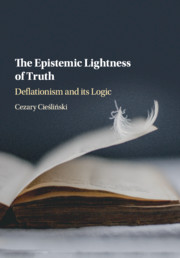Book contents
5 - The Generalisation Problem
from Part I - Disquotation
Published online by Cambridge University Press: 30 November 2017
Summary
Even if we agree that truth permits us to express generalisations which would otherwise remain inexpressible, does it really show the usefulness of the notion of truth? Assume that, as users of a given base theory, we accept (separately) each sentence from the set A. Assume also that we have at our disposal the sentence τ, stating (in intuitive terms) that all elements of A are true, together with a convincing explanation of what it means for τ to express our simultaneous acceptance of all elements of A. Are we finished? Is there really nothing else required?
The worry is that even with all of this at our disposal, we still have not answered the question of when – or under what conditions – we are entitled to accept τ. What are the assertability conditions for this sentence? And if none are produced – or, alternatively, if the ones which are produced are unattainable – what is to be gained in recognising that τ expresses our simultaneous acceptance of all elements of A? What is the point of merely expressing it if we are never able to establish τ as acceptable?
Employing the previous example again, assume that we are able to recognise that the sentence ‘All substitutions of ϕ→ϕ are true’ expresses our simultaneous acceptance of each concrete instance of ‘ϕ → ϕ’. The question is: so what? What is the point, if we are not able to assert this sentence? This concern can be formulated as the following challenge: ‘So you claim that the role of truth is to express generalisations? Fine. But generalisations which cannot be asserted are useless. And if the only role of truth is to permit us to express something useless, then the notion of truth is useless as well’.
One rejoinder consists in observing that the theory of truth is not the only admissible source of the assertability conditions. We may also have inductive empirical grounds for accepting a given truth-involving generalisation. When analysing a large sample of the pope's past theological statements, I discover to my surprise that all of them – without even a single exception – were true.
- Type
- Chapter
- Information
- The Epistemic Lightness of TruthDeflationism and its Logic, pp. 68 - 82Publisher: Cambridge University PressPrint publication year: 2017



